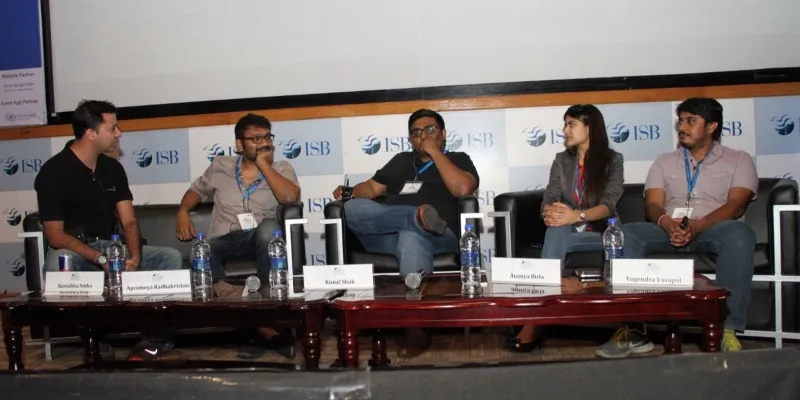Education, innovation and ideas are independent - Kunal Shah, Founder, FreeCharge
"You're wasting time and money doing MBA," said Kunal Shah, Founder FreeCharge, in a panel discussion with Aprameya Radhakrishnan, Co-Founder of TaxiForSure, Ananya Birla, Founder of Svatantra, and Yogendra Pal, Founder Stayzilla, at the ISB Leadership Summit 2015, Hyderabad on November 8th.
The panel, titled ‘Young Designers of India’, saw some riveting discussions around, how the education system needs to catch play with the current fast paced growth and the different aspects of innovation. We live in a digital era where learning something is available free of cost on the Internet. We no longer live in the world of norms or conventions.

Education system not keeping up with current times
Education, Kunal adds, is slow in catching up with what the world has to offer us. The shelf life of business models have reduced from 30 years to four years. Colleges unfortunately, Kunal says, apply the lens of 1990's to the present day models. In today's world you deal with some real people, who cannot be swayed by random jargons. The number of critical decisions taken in a week in companies today is probably more than what older corporates would take a quarter for.
"When I first went online I was 18 years old and for three months I downloaded several video lectures and lessons, and that's where I learnt my stuff. College started becoming painful. I started making money and would learn more things online," says Yogendra Pal, CEO, Stayzilla.
While an MBA degree might guarantee quantity and a certain benchmark, it certainly is no guarantee of quality. Explaining further, Yogendra added that the MBA degree is like a crown. If you're a lion the crown suits you. If you're not, anyway you're going to be found out.
Also read: Laws of mobile growth from Kunal Shah: No marketing team, chasing the top 5% and more
Colleges of today are a social and cultural playground
"Throughout my college years I never learnt how to make money or run a business. Education definitely doesn't teach you that. College is a social experiment. You're put in one place together with a bunch of people and you figure out who you are," says Aprameya.
If you're expecting to learn how to startup, you won't learn that in a college. But if you're willing to learn more about yourself and what aspect of life you're good at, then college is the perfect spot. "For me, education was more about understanding different people, knowing more about different cultures, and getting to know myself better," says Ananya.
Triggers that help startup
While college education didn't actually help any of the founders to start up, they all had different triggers to do so. The common theme was finding a solution to an existing problem. To start up, it's important to solve a considerably large problem. For Ananya, it was the fact that there was a mismatch of balance of income in different aspects of the society and micro finance seemed like the best answer.
Aprameya says commuting was a major problem for him. "Raghu and I started discussing life's problems one evening and we came up with the concept of TaxiForSure," says Aprameya.
Kunal has a different peg. He adds that all wealth creation is done on the basis of addictions of other people. "The need to have a stable monthly salary too is an addiction," adds Kunal. All semblance of success, Kunal says, has come when people have given up the addiction to a steady monthly income. "In a way, we too are trying to create a good one-way addiction of ensuring you keep using online methods of payment," says Kunal.
Understanding consumer behaviour
Each startup begins with an idea and a trigger, but the key is getting the right market insights and understanding behaviours. FreeCharge team believed that the change in behaviour they were making was irreversible, but they had to tackle the issue of trust deficit. So it meant giving incentives initially.
"I didn't start up to make money, I was making money from my sixth class," says Yogendra. He adds that after a point making money lost its charm because he wasn't creating any value. After looking at different business models and ideas, Yogendra realised that he wanted a business that had a large number of suppliers. That's when he saw the travel and tourism space and closed in on the idea of Stayzilla.
For Svatantra, the social parameters work differently. Banking the unbanked is a strong proposition. It's the first step towards growth. Social collaterals, Ananya says, has worked brilliantly in the rural areas as the fear of ostracisation is strong in rural India. She also figured that in rural India, women worked as better collaterals than men. "For women, the money goes into the business or towards the house, unlike the men," adds Ananya.







